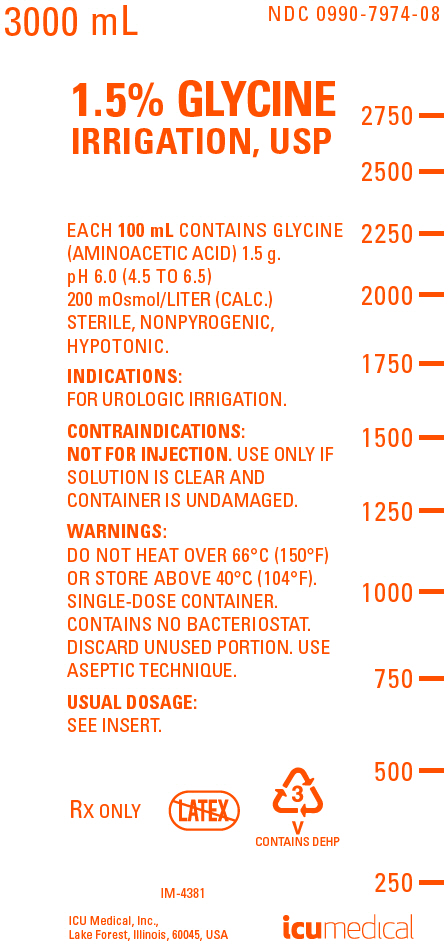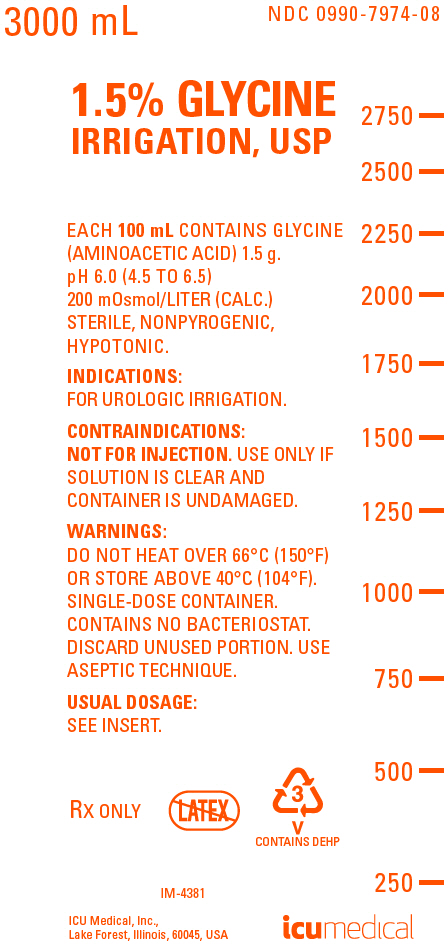Label: GLYCINE irrigant
- NDC Code(s): 0990-7974-08
- Packager: ICU Medical Inc.
- Category: HUMAN PRESCRIPTION DRUG LABEL
- DEA Schedule: None
- Marketing Status: New Drug Application
Drug Label Information
Updated April 14, 2023
If you are a consumer or patient please visit this version.
- Download DRUG LABEL INFO: PDF XML
- Official Label (Printer Friendly)
- SPL UNCLASSIFIED SECTION
-
DESCRIPTION
1.5% Glycine Irrigation, USP is a sterile, nonpyrogenic, hypotonic, aqueous solution of glycine intended only for urologic irrigation during transurethral surgical procedures.
Each 100 mL contains 1.5 g of glycine in water for injection. The solution is nonelectrolytic, hypotonic and has an osmolarity of 200 mOsmol/liter (calc.); pH 6.0 (4.5 to 6.5).
The solution contains no bacteriostat, antimicrobial agent or added buffer and is intended only for use as a single-dose irrigation. When smaller volumes are required, the unused portion should be discarded.
1.5% Glycine Irrigation is a urologic nonelectrolyte irrigant.
Glycine, USP is chemically designated aminoacetic acid (C2H5NO2), a white crystalline powder freely soluble in water. It has the following structural formula:
NH2CH2COOH
Water for Injection, USP is chemically designated H20.
The flexible plastic container is fabricated from a specially formulated polyvinylchloride. Water can permeate from inside the container into the overwrap but not in amounts sufficient to affect the solution significantly.
The semi-rigid container is fabricated from a specially formulated polyolefin. It is a copolymer of ethylene and propylene. The container requires no vapor barrier to maintain the proper drug concentration.
The flexible plastic container is fabricated from a specially formulated polyvinylchloride. Water can permeate from inside the container into the overwrap but not in amounts sufficient to affect the solution significantly. Solutions in contact with the plastic container may leach out certain chemical components from the plastic in very small amounts; however, biological testing was supportive of the safety of the plastic container materials. Exposure to temperatures above 25°C/77°F during transport and storage will lead to minor losses in moisture content. Higher temperatures lead to greater losses. It is unlikely that these minor losses will lead to clinically significant changes within the expiration period.
-
CLINICAL PHARMACOLOGY
Glycine is an amino acid and a nonelectrolyte. A solution of glycine in water is therefore nonconductive and suitable for urologic irrigation during electrosurgical procedures. A 1.5% concentration of glycine in water (200 mOsmol/liter calc.) is sufficient to minimize the risk of intravascular hemolysis which can occur from absorption of plain water through open prostatic veins during transurethral resection (TUR). It is hypotonic in relation to the extracellular fluid (280 mOsmol/liter). Any solution absorbed intravascularly during transurethral prostatic or bladder surgery, although variable in amount depending primarily on the extent of surgery, will be excreted by the kidney. Studies have shown that the absorption of glycine does not cause significant hemolysis (increase of free hemoglobin) or release significant amounts of free ammonia in the blood. Glycine is rapidly degraded in the liver by glycine oxidase.
Water is an essential constituent of all body tissues and accounts for approximately 70% of total body weight. Average normal adult daily requirement ranges from two to three liters (1.0 to 1.5 liters each for insensible water loss by perspiration and urine production).
Water balance is maintained by various regulatory mechanisms. Water distribution depends primarily on the concentration of electrolytes in the body compartments and sodium (Na+) plays a major role in maintaining physiologic equilibrium.
- INDICATIONS AND USAGE
- CONTRAINDICATIONS
-
WARNINGS
FOR UROLOGIC IRRIGATION ONLY.
Solutions for urologic irrigation must be used with caution in patients with severe cardiopulmonary or renal dysfunction. Irrigating fluids used during transurethral prostatectomy have been demonstrated to enter the systemic circulation in relatively large volumes. Thus, glycine irrigating solution must be regarded as a systemic drug. Absorption of large amounts of fluids containing glycine may significantly alter cardiopulmonary and renal dynamics.
Do not heat container over 66°C (150°F).
-
PRECAUTIONS
Cardiovascular status, especially of the patient with cardiac disease, should be carefully observed before and during transurethral resection of the prostate when using glycine irrigating solution, because the quantity of fluid absorbed into the systemic circulation by opened prostatic veins may produce significant expansion of the extracellular fluid and lead to fulminating congestive heart failure. Shift of sodium free intracellular fluid into the extracellular compartment following systemic absorption of solution may lower serum sodium concentration and aggravate pre-existing hyponatremia.
Care should be exercised if impaired liver function is known or suspected. Under such conditions, ammonia resulting from metabolism of glycine may accumulate in the blood.
Aseptic technique is essential with the use of sterile solutions for irrigation. The administration set should be attached promptly. Unused portions should be discarded and a fresh container of appropriate size used for the start-up of each cycle or repeat procedure.
Do not administer unless solution is clear, seal is intact and container is undamaged. Discard unused portion.
Carcinogenesis, Mutagenesis, Impairment of Fertility: Studies with Glycine Irrigation, USP have not been performed to evaluate carcinogenic potential, mutagenic potential, or effects on fertility.
Nursing Mothers: Caution should be exercised when Glycine Irrigation, USP is administered to a nursing woman.
Pregnancy: Teratogenic Effects.
Pregnancy Category C. Animal reproduction studies have not been conducted with Glycine Irrigation, USP. It is also not known whether Glycine Irrigation, USP can cause fetal harm when administered to a pregnant woman or can affect reproduction capacity. Glycine Irrigation, USP should be given to a pregnant woman only if clearly needed.
-
ADVERSE REACTIONS
Adverse reactions may result from intravascular absorption of glycine. Large intravenous doses of glycine are known to cause salivation, nausea and lightheadedness. Other consequences of absorption of urologic irrigating solutions include fluid and electrolyte disturbances such as acidosis, electrolyte loss, marked diuresis, urinary retention, edema, dryness of mouth, thirst, dehydration, coma from hyponatremia, secondary hyponatremia due to fluid overload, and hyperammonemia with resultant coma and/or encephalopathy; cardiovascular disorders such as hypotension, tachycardia, angina-like pains; pulmonary disorders such as pulmonary congestion; and other general reactions such as blurred vision, convulsions, nausea, vomiting, rhinitis, chills, vertigo, backache, transient blindness and urticaria. Allergic reactions from glycine are unknown or exceedingly rare.
Should any adverse reaction occur, discontinue the irrigant, evaluate the patient, institute appropriate therapeutic countermeasures and save the remainder of the fluid for examination if deemed necessary.
- OVERDOSAGE
-
DOSAGE AND ADMINISTRATION
1.5% Glycine Irrigation, USP should be administered only by transurethral instillation with appropriate urologic instrumentation. A disposable irrigation set should be used. The total volume of solution used for irrigation is solely at the discretion of the surgeon.
Height of container(s) above the operating table in excess of 60 cm (approx. 2 ft.) has been reported to increase intravascular absorption of the irrigating fluid.
Drug Interactions
Additives may be incompatible. Consult with pharmacist, if available. When introducing additives, use aseptic technique, mix thoroughly and do not store.
Parenteral drug products should be inspected visually for particulate matter and discoloration prior to administration, whenever solution container permits. See PRECAUTIONS.
-
HOW SUPPLIED
1.5% Glycine Irrigation, USP is supplied in single-dose 3000 mL flexible irrigation container
NDC No. Product Container Size (mL) 0409-7974-08 1.5% Glycine Irrigation, USP 3000 mL 0990-7974-08 1.5% Glycine Irrigation, USP 3000 mL ICU Medical is transitioning NDC codes from the "0409" to a "0990" labeler code. Both NDC codes are expected to be in the market for a period of time.
Exposure of pharmaceutical products to heat should be minimized. Avoid excessive heat. Protect from freezing. Store at 20 to 25°C (68 to 77°F). [See USP Controlled Room Temperature.]
Revised: November, 2022
ICU Medical, Inc., Lake Forest, Illinois, 60045, USA
IFU0000478
-
PRINCIPAL DISPLAY PANEL - 3000 mL Bag Label
3000 mL
NDC 0990-7974-081.5% GLYCINE
IRRIGATION, USPEACH 100 mL CONTAINS GLYCINE
(AMINOACETIC ACID) 1.5 g.
pH 6.0 (4.5 TO 6.5)
200 mOsmol/LITER (CALC.)
STERILE, NONPYROGENIC,
HYPOTONIC.INDICATIONS:
FOR UROLOGIC IRRIGATION.CONTRAINDICATIONS:
NOT FOR INJECTION. USE ONLY IF
SOLUTION IS CLEAR AND
CONTAINER IS UNDAMAGED.WARNINGS:
DO NOT HEAT OVER 66°C (150°F)
OR STORE ABOVE 40°C (104°F).
SINGLE-DOSE CONTAINER.
CONTAINS NO BACTERIOSTAT.
DISCARD UNUSED PORTION. USE
ASEPTIC TECHNIQUE.USUAL DOSAGE:
SEE INSERT.RX ONLY
3
V
CONTAINS DEHPIM-4381
ICU Medical, Inc.,
Lake Forest, Illinois, 60045, USAicumedical

-
PRINCIPAL DISPLAY PANEL - Overwrap Label
2
HDPETO OPEN TEAR AT NOTCH
DO NOT REMOVE FROM OVERWRAP UNTIL READY FOR USE. AFTER REMOVING
THE OVERWRAP, CHECK FOR MINUTE LEAKS BY SQUEEZING CONTAINER FIRMLY.
IF LEAKS ARE FOUND, DISCARD SOLUTION AS STERILITY MAY BE IMPAIRED.
RECOMMENDED STORAGE: ROOM TEMPERATURE (25°C). AVOID EXCESSIVE
HEAT. PROTECT FROM FREEZING. SEE INSERT.
98-4321-R14-3/98
-
INGREDIENTS AND APPEARANCE
GLYCINE
glycine irrigantProduct Information Product Type HUMAN PRESCRIPTION DRUG Item Code (Source) NDC:0990-7974 Route of Administration IRRIGATION Active Ingredient/Active Moiety Ingredient Name Basis of Strength Strength GLYCINE (UNII: TE7660XO1C) (GLYCINE - UNII:TE7660XO1C) GLYCINE 1.5 g in 100 mL Inactive Ingredients Ingredient Name Strength WATER (UNII: 059QF0KO0R) Packaging # Item Code Package Description Marketing Start Date Marketing End Date 1 NDC:0990-7974-08 4 in 1 CASE 07/01/2019 1 1 in 1 POUCH 1 3000 mL in 1 BAG; Type 0: Not a Combination Product Marketing Information Marketing Category Application Number or Monograph Citation Marketing Start Date Marketing End Date NDA NDA018315 07/01/2019 Labeler - ICU Medical Inc. (118380146)


